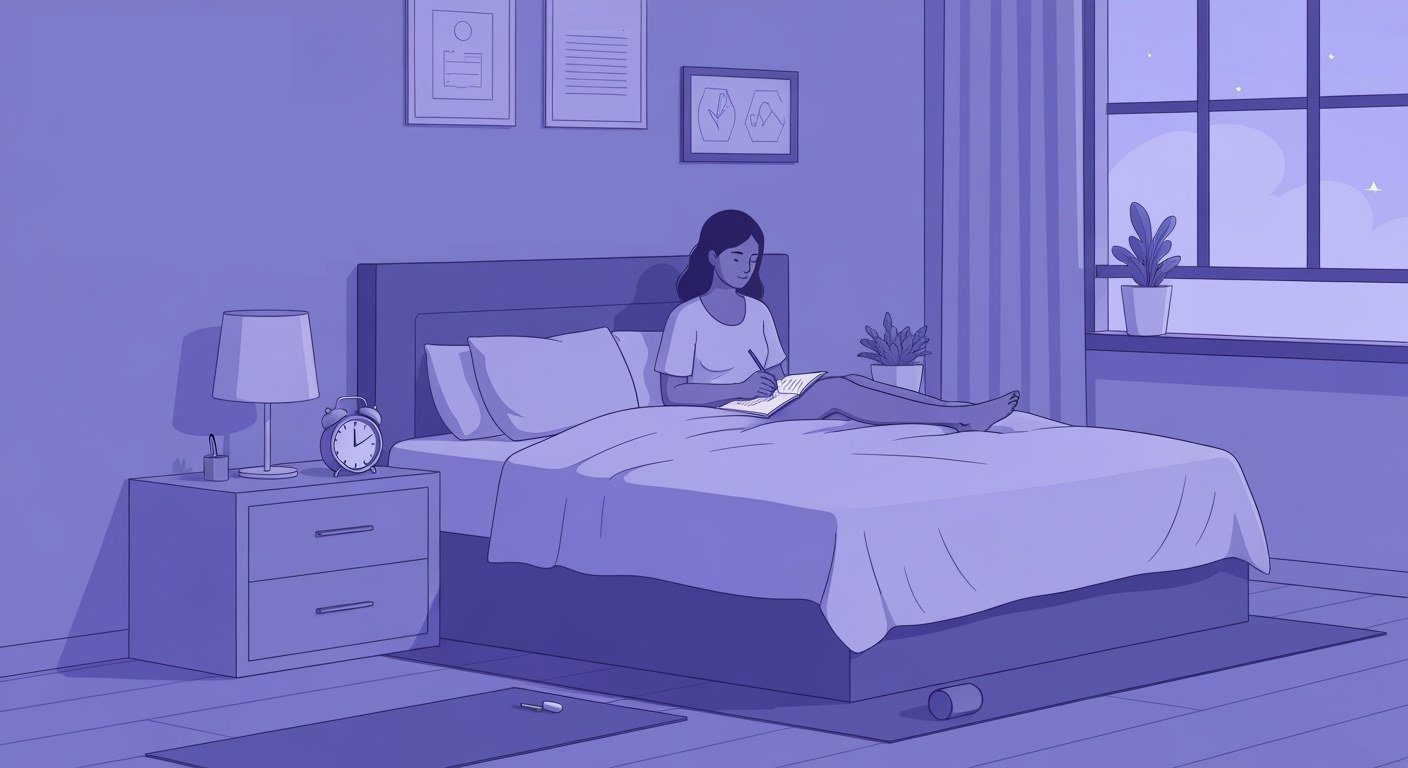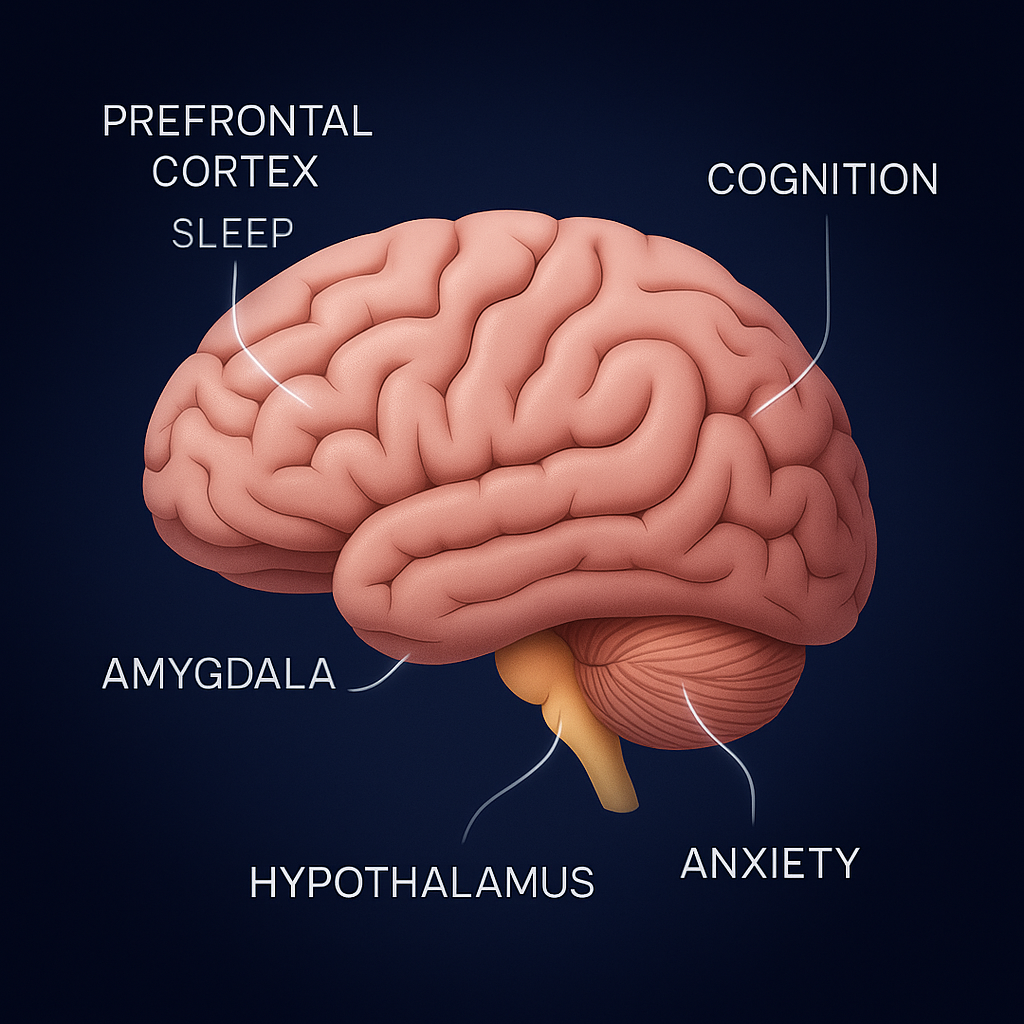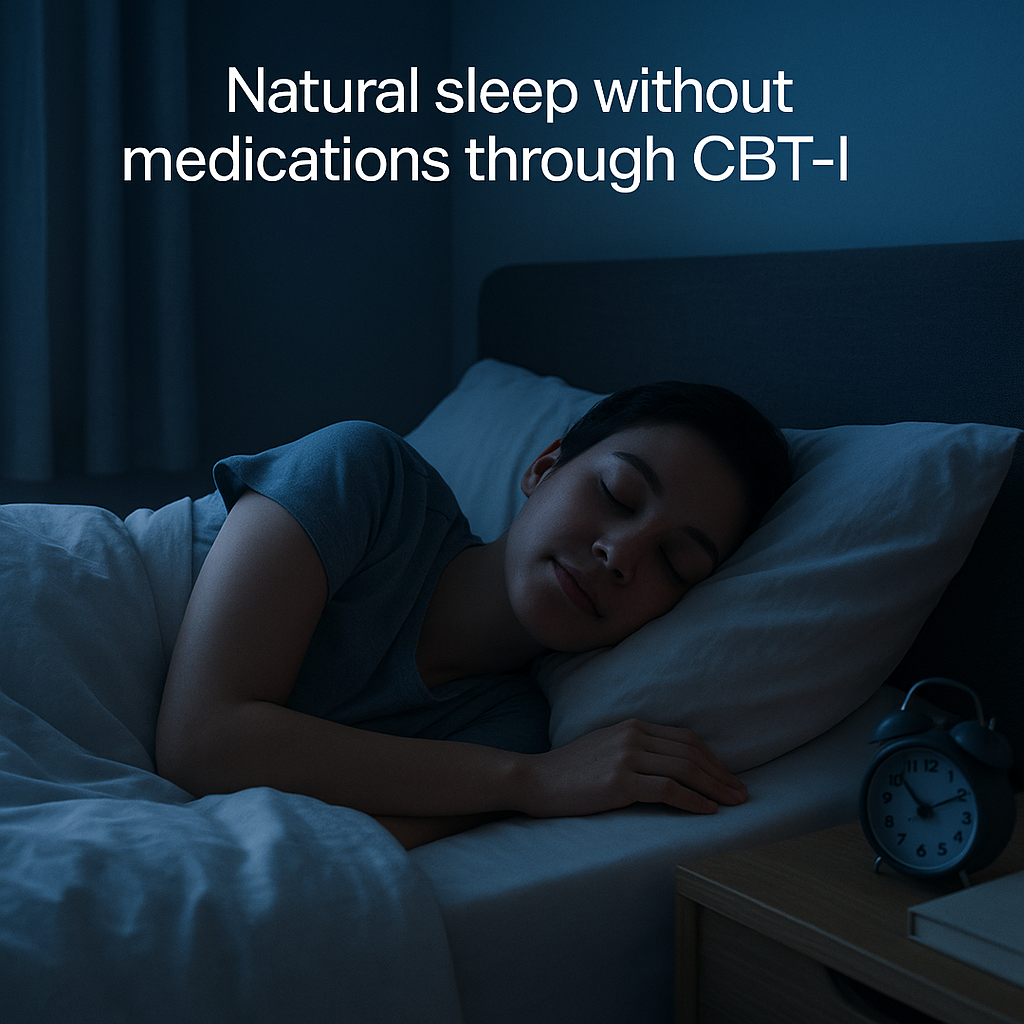Evidence-Based Sleep Treatment
What is CBT-I?
The Gold Standard for Insomnia Treatment
Cognitive Behavioral Therapy for Insomnia (CBT-I) is a proven, non-medical treatment that addresses the root causes of sleep problems. Unlike sleeping pills, CBT-I provides lasting results by changing the thoughts and behaviors that keep you awake. Recommended by sleep specialists worldwide as the first-line treatment for chronic insomnia.

CBT-I Success Statistics
Real results from clinical research and our Canadian network
Understanding CBT-I: More Than Just Sleep Hygiene
CBT-I is a structured, evidence-based program that goes far beyond basic sleep tips
Why CBT-I Works When Other Treatments Fail
Unlike medications that only provide temporary relief, CBT-I addresses the underlying psychological and behavioral factors that maintain insomnia. Research shows that CBT-I is more effective than sleeping pills for long-term sleep improvement, with benefits lasting years after treatment completion.
Cognitive Component
Identifies and changes negative thought patterns about sleep that create anxiety and perpetuate insomnia.
Behavioral Component
Modifies sleep habits and behaviors through techniques like sleep restriction and stimulus control.
Sleep Education
Provides comprehensive understanding of sleep science and healthy sleep practices.
Core CBT-I Techniques
The proven methods that make CBT-I the most effective insomnia treatment
Sleep Restriction Therapy
Limits time in bed to match actual sleep time, improving sleep efficiency and reducing time lying awake.
Stimulus Control
Re-associates the bedroom with sleep by establishing consistent sleep-wake schedules and bedroom rules.
Cognitive Restructuring
Identifies and challenges unhelpful thoughts about sleep that increase anxiety and worsen insomnia.
Relaxation Training
Teaches progressive muscle relaxation, breathing techniques, and mindfulness to reduce pre-sleep tension.
Sleep Hygiene Education
Optimizes sleep environment and daytime habits that support healthy sleep patterns.
Relapse Prevention
Develops strategies to maintain sleep improvements and handle occasional sleep disruptions.
How CBT-I Treatment Works
A typical CBT-I program follows a structured, evidence-based approach
Assessment & Sleep History
Comprehensive evaluation of your sleep patterns, medical history, and factors contributing to insomnia using sleep diaries and questionnaires.
Personalized Treatment Plan
Based on your assessment, a customized CBT-I program is developed targeting your specific sleep challenges and goals.
6-8 Weekly Sessions
Regular therapy sessions (individual or group) where you learn and practice CBT-I techniques with professional guidance and support.
Progress Monitoring
Continuous tracking of sleep improvements through sleep diaries, with adjustments made to optimize your treatment response.
Long-term Success
Maintenance strategies and follow-up support ensure lasting sleep improvements and provide tools for future sleep challenges.
CBT-I vs. Sleep Medications: The Clear Winner
Scientific research consistently shows CBT-I superiority for long-term sleep health
Why Sleep Specialists Recommend CBT-I First
Major medical organizations including the American Academy of Sleep Medicine and Canadian Sleep Society recommend CBT-I as the first-line treatment for chronic insomnia. This evidence-based approach provides the most comprehensive and lasting solution for sleep problems.
No Side Effects
CBT-I has no adverse effects, unlike sleep medications which can cause dependency, tolerance, and morning grogginess.
Lasting Results
Benefits persist long after treatment ends, while medications only work while being taken.
Addresses Root Causes
Treats underlying factors maintaining insomnia rather than just masking symptoms.
Cost-Effective
One-time treatment investment provides years of better sleep, unlike ongoing medication costs.
Who Benefits from CBT-I?
CBT-I effectively treats various sleep challenges across diverse populations
Primary treatment for difficulty falling asleep, staying asleep, or early morning awakening lasting 3+ months.
Helps healthcare workers, first responders, and others adapt to irregular schedules while maintaining sleep quality.
Addresses racing thoughts, worry, and sleep anxiety that keep people awake at night.
Provides a pathway to reduce or eliminate reliance on sleep medications while maintaining good sleep.
Manages sleep problems triggered by work stress, life transitions, or traumatic events.
Helps older adults adapt to natural sleep pattern changes while maintaining restorative sleep.
Frequently Asked Questions About CBT-I
Get answers to common questions about Cognitive Behavioral Therapy for Insomnia
What is CBT-I and how does it work for insomnia?
CBT-I (Cognitive Behavioral Therapy for Insomnia) is a structured, evidence-based treatment that combines cognitive therapy, behavioral interventions, and sleep education. It works by identifying and changing thoughts and behaviors that interfere with sleep, using techniques like sleep restriction, stimulus control, and cognitive restructuring to break the cycle of insomnia.
How long does CBT-I treatment take to cure insomnia?
Most CBT-I programs consist of 6-8 weekly sessions lasting 45-60 minutes each. Patients typically begin experiencing sleep improvements within 2-4 weeks, with significant results by week 6-8. Unlike sleep medications, CBT-I provides lasting benefits that continue long after treatment completion.
Is CBT-I better than sleeping pills for chronic insomnia?
Yes, research consistently shows CBT-I is more effective than sleep medications for long-term insomnia treatment. CBT-I provides lasting results without side effects, dependency risks, or tolerance issues. While medications only work while being taken, CBT-I creates permanent changes in sleep patterns and behaviors.
Does CBT-I work for sleep anxiety and racing thoughts at bedtime?
Absolutely. CBT-I specifically targets sleep-related anxiety through cognitive restructuring techniques that identify and challenge catastrophic thoughts about sleep. It teaches relaxation techniques, mindfulness, and thought-stopping strategies to quiet racing minds and reduce bedtime anxiety.
Can I do CBT-I online or do I need in-person therapy sessions?
Both online and in-person CBT-I are highly effective. Digital CBT-I programs (dCBT-I) and telehealth sessions have shown comparable success rates to face-to-face treatment. Online options make CBT-I accessible regardless of location, schedule constraints, or mobility limitations.
Is CBT-I covered by health insurance in Canada?
Coverage varies by province and insurance plan. Many extended health benefits cover psychology services that include CBT-I. Some provinces offer publicly funded CBT-I programs. Our platform helps connect you with providers who accept your specific insurance and can guide you through coverage options.
What conditions can CBT-I treat besides chronic insomnia?
CBT-I effectively treats various sleep disorders including sleep maintenance insomnia, early morning awakening, shift work sleep disorder, sleep anxiety, and insomnia related to chronic pain, PTSD, depression, or medical conditions. It also helps people reduce dependence on sleep medications.
How do I find a qualified CBT-I therapist near me in Canada?
We have you covered! MySleepHealth.ca connects you with licensed CBT-I therapists and sleep specialists across Canada. You can search by location, read therapist profiles, and book appointments online. All our providers are trained in evidence-based CBT-I techniques to ensure you receive the highest quality care. Start by taking our free sleep assessment to better understand your sleep patterns before meeting with a therapist.
Ready to Transform Your Sleep with CBT-I?
Join thousands of Canadians who have overcome insomnia through evidence-based CBT-I treatment. Take the first step toward better sleep health today.

